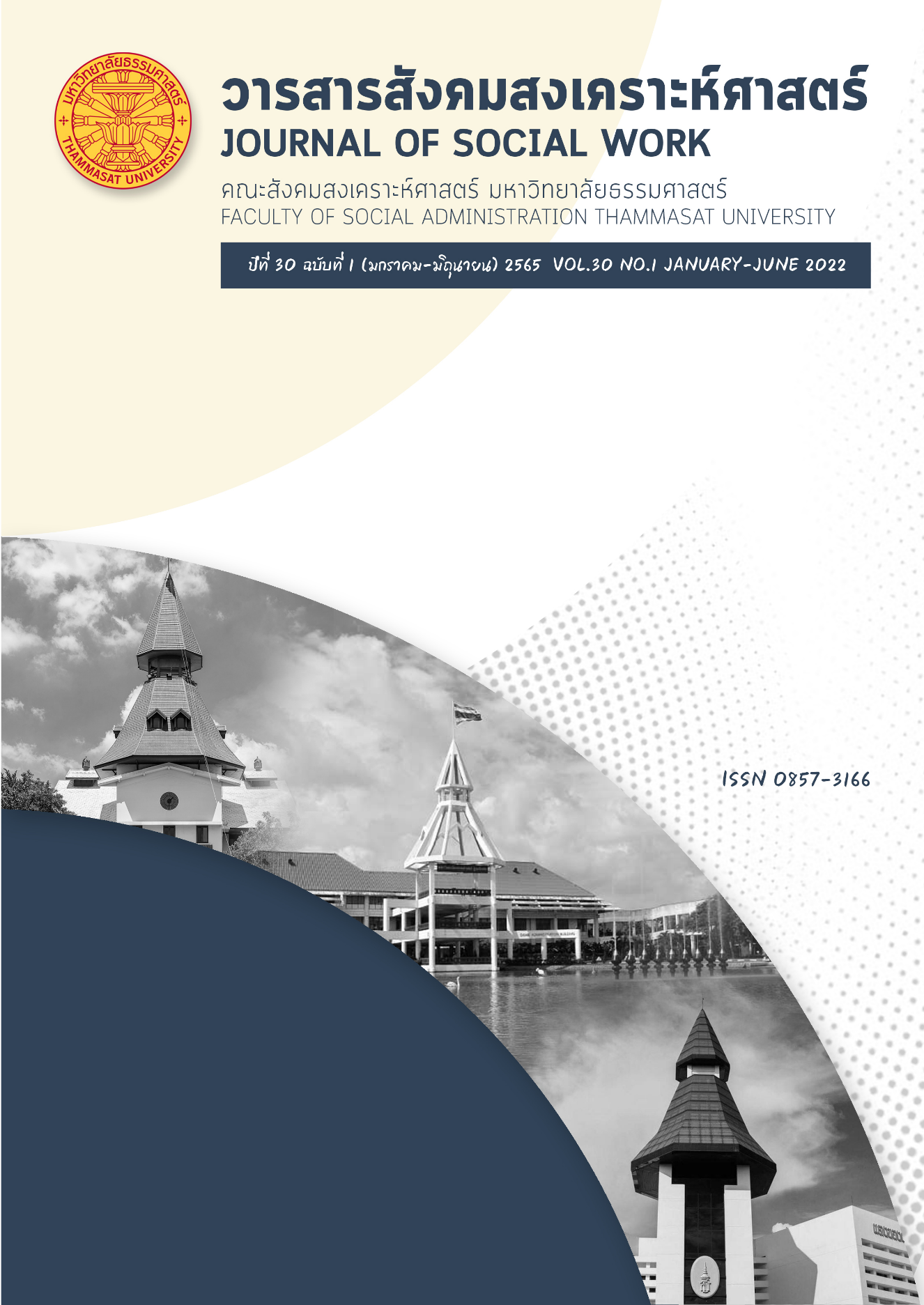Mental Health Literacy and Supports among Thammasat University Lampang Center Students
Keywords:
Mental Health Literacy, Mental health supports, University studentsAbstract
The purpose of this study was to investigate mental health literacy among Thammasat University, Lampang Center students, as well as the guidelines for mental health assistance for Thammasat University, Lampang Center students, using quantitative and qualitative data collection methods. In terms of quantitative research, online questionnaires were used to collect data. 325 students from Thammasat University, Lampang Center, Year 2020 had a confidence level of 0.83 on the Literacy Assessment Tool using stratified random sampling. The qualitative study collected data through group discussions with 14 subjects chosen through purposive sampling. is the chairman of each faculty's student, and then a snowball selection of the key informants of each faculty.
According to the quantitative data analysis, the sample population had a medium level of mental health literacy. When the amount of knowledge in each area was taken into account, the average was 79.08 (S.D. = 8.87). The sample group demonstrated a high level of understanding of mental health information sources. The mean score was 15.66 (S.D. = 2.34), and all other factors, such as knowledge of disease or mental illness, were moderate. The mean was 8.54 (S.D. = 1.78) for understanding on how to obtain therapy or treatment for mental illness. The mean score for understanding of people with mental health problems was 5.72 (S.D. = 1.12). The average score was 30.95 (S.D. = 5.89), and mental illness was associated with attitude. The average score was 24.75 with a standard deviation of 5.21. The qualitative research findings suggest that the student mental health support approach should include a mechanism to assist mental health education training. Public relations work is needed to gain an understanding of the patient's image and the services offered to students. The correct mental health information should be provided, and at the faculty and university levels, stigmatization of people with mental illnesses or mental health difficulties should be reduced. Students experiencing mental health issues would benefit from the increased availability of online counseling or a helpline telephone service. In addition, the frequency and number of people involved in consulting services should be increased.
References
กรมสุขภาพจิต. (2562). กรมสุขภาพจิต ห่วงวัยรุ่นเยาวชนไทยมีภาวะซึมเศร้า แนะคนรอบข้างรับฟังอย่างเข้าใจ. สืบค้นจาก https://new.camri.go.th/
กรมสุขภาพจิต. (2562). "โรคซึมเศร้า" ทำใจพัง เช็กลิสต์สาเหตุและอาการ, สืบค้นจาก https://www.dmh.go.th/news-dmh/view.asp?id=30114
เชษฐา แก้วพรม และคณะ (2557) . ความฉลาดทางสุขภาพจิตของอาสาสมัครสาธารณสุขประจำหมู่บ้าน กรณีศึกษาสองตำบลในพื้นที่อำเภอขลุง จันทบุรี. วารสารวิจัยทางวิทยาศาสตร์สุขภาพ, 8(1), 10-16.
ณัฐวุฒิ อรินทร์. (2553). ตัวแปรที่มีอิทธิพลต่อความตั้งใจที่จะขอรับความช่วยเหลือด้านสุขภาพจิตจากนักวิชาชีพสุขภาพจิตของนิสิตมหาวิทยาลัย. วารสารพฤติกรรมศาสตร์, 16(1), 82-101.
ณัฏฐภัณฑ์สัณฑ์ ศรีวิชัย วราภรณ์ บุญเชียง และ พิมพ์ชนก เครือสุคนธ์. (2563). ความสัมพันธ์ระหว่างความรอบรู้สุขภาพจิต ความผาสุกทางจิตใจ และ
ความเหงาในนักศึกษามหาวิทยาลัยเชียงใหม่. มนุษยศาสตร์สาร, 22(1), 144-161.
นุสรา นามเดช. (2561). ความรอบรู้ทางสุขภาพจิต ของนักเรียนมัธยมศึกษาตอนปลาย จังหวัดสระบุรี. วารสารการพยาบาลและการศึกษา, 11(3), 125-138.
ปรารถนา สวัสดิสุธา และคณะ. (2559). การจัดการกับความเครียดของนักเรียนระดับมัธยมศึกษาตอนปลาย ในกรุงเทพมหานคร. วารสารสมาคมจิตแพทย์แห่งประเทศไทย, 61(1), 41-52.
วัชราพร เชยสุวรรณ. (2560). ความรอบรู้ด้านสุขภาพ:แนวคิดและการประยุกต์สู่การปฏิบัติการพยาบาล. วารสารแพทย์นาวี, 44(3), 183–197.
อรุโณทัย ปาทาน และสิริมา มงคลสัมฤทธิ์. (2563). ประสิทธิผลของโปรแกรมสร้างเสริมความรอบรู้ด้านการดูแลสุขภาพจิตผู้สูงอายุของอาสาสมัครสาธารณสุขประจำหมู่บ้าน เทศบาลเมืองปทุมธานี. วารสารพฤติกรรมศาสตร์เพื่อการพัฒนา, 12(2), 215-231.
Allen, L., Brett, M., Brooker, A., Field, R., James, R., and Wyn, J. (2016). A Framework Promoting Student Mental Well-being in Universities student wellbeing. edu.au.
Auttama, N, Seangpraw K, Ong-Artborirak, P. & Tonchoy, P. (2019). Factors Associated with Self-Esteem, Resilience, Mental Health, and Psychological Self-Care Among University Students in Northern Thailand. J Multidiscip Healthc. 2021(14), 1213-1221
Debra, Rickwood, Frank, P. Deane, Coralie, J. Wilson & Joseph, Ciarrochi (2005) Young people’s help-seeking for mental health problems, Australian e-Journal for the Advancement of Mental Health, 4:3, 218-251, DOI: 10.5172/jamh.4.3.218
Dizon, A. Alvin Ryan (2019). Students’ Mental Health Literacy of One State University as Basis for Strategic Action Areas. Asia Pacific Journal of Multidisciplinary Research, 7(3), 48-55.
Dougas, V.A. (1984). The psychological proesses implicated in A.D.D. In L.M. indale (Ed.), Attention deficit disorder: Diagnostic, cognitive and theraputic understanding. NY: Speutrum.
Douglas, A. Spiker & Joseph, H. Hammer. (2019). Mental health literacy as theory: current challenges and future directions, Journal of Mental Health, 28:3, 238-242, DOI:10.1080/09638237. 2018.1437613
Krejcie, R. V., & Morgan, D. W. (1970). Determining sample size for research activities. Educational and Psychological Measurement, 30(3), 607–610.
Nasser, Aloud, & Amena, Rathur (2009) Factors Affecting Attitudes Toward Seeking and Using Formal Mental Health and Psychological Services Among Arab Muslim Populations, Journal of Muslim Mental Health, 4(2), 79-103, DOI:10.1080/15564900 802487675
O'Connor, M., Casey, L. (2015). The Mental Health Literacy Scale (MHLS): A new scale-based measure of mental health literacy. Psychiatry Research, 229(1), 511-516.
Downloads
Published
How to Cite
Issue
Section
License
Copyright (c) 2022 Journal of Social Work

This work is licensed under a Creative Commons Attribution-NonCommercial-NoDerivatives 4.0 International License.
The manuscripts published in the Social Work Journal is the copyright of the Social Work Journal, Thammasat University
Any article or opinion appeared in the Social Work Journal will solely be under the responsibility of the author The Faculty of Social Administration, Thammasat University and the editors do not need to reach in agreement or hold any responsibility.



